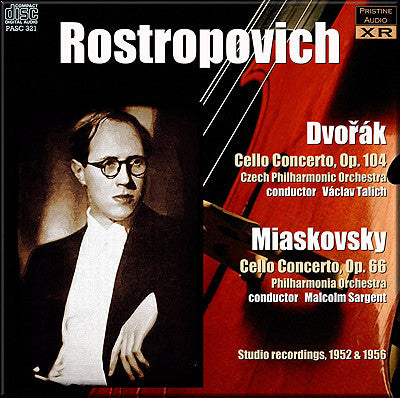
This album is included in the following sets:
This set contains the following albums:
- Producer's Note
- Full Track Listing
- Cover Art
- Additional Notes
Rostropovich's first recording of his most famous concert work
Dvořák's - and Miakovsky's - Cello Concerto now in glorious 32-bit XR remastered sound quality
Rostropovich's 1952 Prague recording of the Dvořák Cello Concerto is one the earliest of what was to become the cellist's "signature tune" - to the extent that he demanded a significantly higher fee for playing any concert which included the work. Previous issues of this Supraphon recording have suffered a harshness of tone which XR remastering has neutralised, whilst bringing out the full tone of both soloist and orchestra. To be able to hear such a fine soloist in this work, playing with the Czech Philharmonic whilst Talich was at his peak is a real pleasure.
I have worked to try as much as possible to balance the tonal qualities of the earlier recording to match the technically superior British 1956 Miaskovsky recording - a work previously unknown to me but a pleasure to become acquainted with.
Andrew Rose
-
DVORAK Cello Concerto in B minor, Op. 104
Czech Philharmonic Orchestra
Václav Talich conductor
Recorded Prague, 19 June 1952. First issued as Supraphon LPM 88/9
-
MIASKOVSKY Cello Concerto, Op. 66
Philharmonia Orchestra
Sir Malcolm Sargent conductor
Recorded 5 March 1956. First issued as HMV ALP 1427
Mstislav Rostropovich cello
XR remastering by Andrew Rose at Pristine Audio, January 2012
Cover artwork based on a photograph of Rostropovich
Total duration: 67:38
Fanfare Review
None has approached Rostropovich for the depth and range of his expressive gestures
Jonathan Woolf

